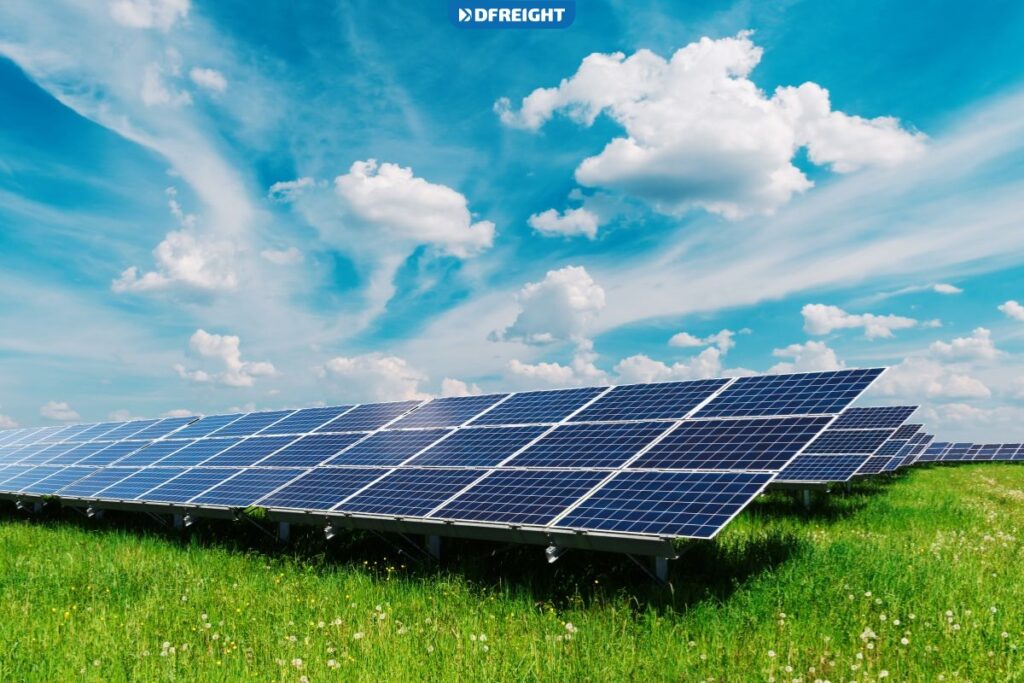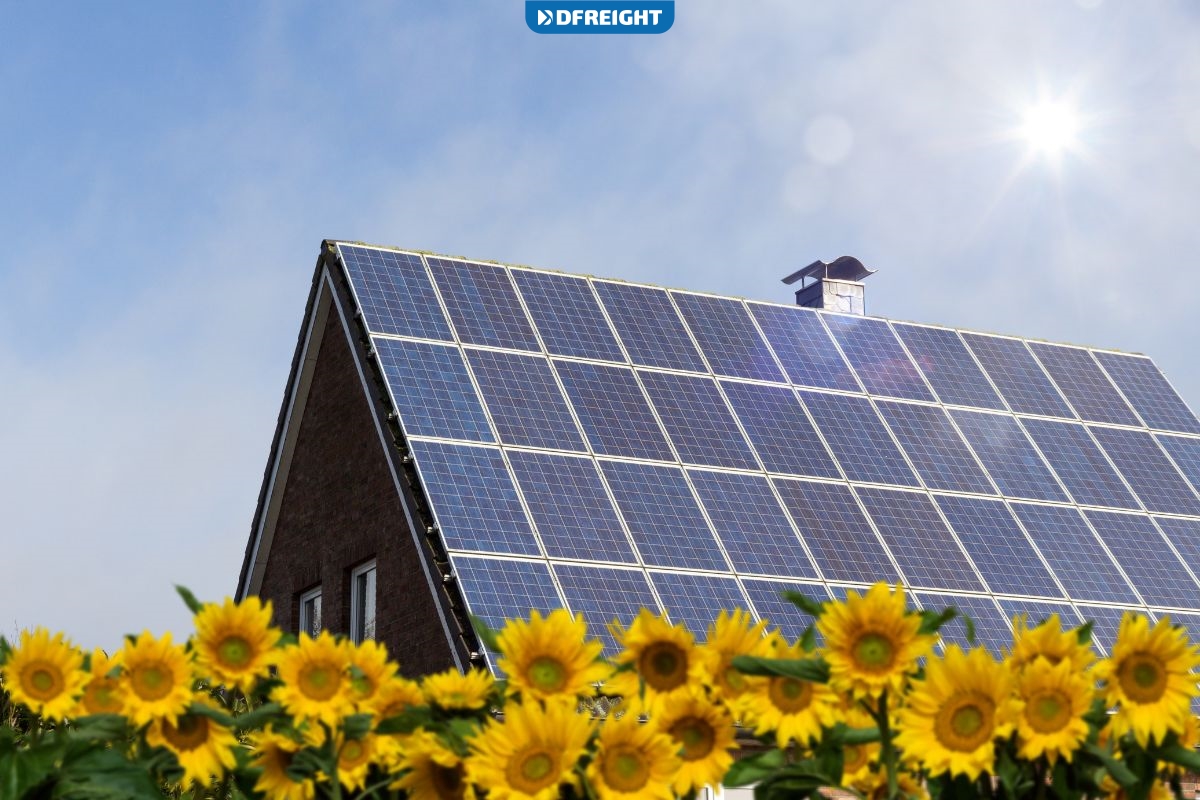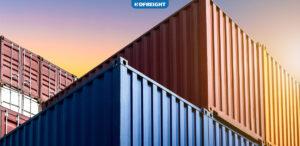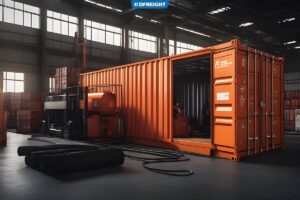The world is embracing renewable energy sources more than ever, with solar power leading towards a sustainable future. Solar panels are becoming increasingly common in households, businesses, and industrial settings. These panels are essential for harnessing and converting the sun’s power into clean and renewable electricity. But have you ever thought about the journey these solar panels undertake before they reach your rooftop or a solar farm? In this blog post, we’ll delve into the importance of shipping solar panels efficiently and sustainably, recognizing their crucial role in building a cleaner, greener world.
Ready to streamline your shipping process and boost your supply chain efficiency? Contact DFreight today for seamless freight forwarding solutions.
Table of Contents
Understanding Solar Panels: A brief introduction to solar panels, their types, and components
Before we dive into the intricate details of shipping solar panels, it’s essential to establish a fundamental understanding of what solar panels are and how they function. Solar panels, also known as photovoltaic (PV) panels, are the heart of solar energy systems and the primary source of harnessing solar power. In this section, we will explore the basics of solar panels, their different types, and the components that make them work.
Solar Panels: The Basics
At their core, solar panels are devices designed to capture sunlight and convert it into electricity. This process, known as photovoltaic conversion, relies on the photovoltaic effect, where certain materials generate an electric current when exposed to sunlight. Solar panels are typically made from semiconductor materials, most commonly crystalline silicon.
Types of Solar Panels
There are two main types of solar panels that are widely used:
- Monocrystalline Solar Panels: These panels are made from a single crystal structure, typically silicon. Monocrystalline panels are known for their high efficiency and sleek appearance. They are often preferred when space is limited, such as on residential rooftops.
- Polycrystalline Solar Panels: Polycrystalline panels are made from multiple silicon crystals. They are more cost-effective to produce but are slightly less efficient than monocrystalline panels. They are a popular choice for larger solar installations like commercial projects and solar farms.
Components of Solar Panels
Solar panels are composed of several key components, each with a specific role in the energy conversion process:
- Photovoltaic Cells: These are the individual units within the solar panel responsible for converting sunlight into electricity. They contain semiconductor materials that generate electrical current when exposed to photons of light.
- Glass Cover: Solar panels are covered with tempered glass that serves as a protective layer. This glass is designed to withstand various weather conditions, including rain, snow, and hail while allowing light to pass through.
- Encapsulation Material: A layer of encapsulation material surrounds the photovoltaic cells and protects them from moisture and physical damage. This material is usually made of ethylene-vinyl acetate (EVA).
- Backsheet: The backsheet is a layer on the back of the panel that provides insulation and protection against humidity and external elements.
- Frame: Many solar panels have an aluminum frame that adds structural support and facilitates mounting. The frame also aids in dissipating heat to keep the panel operating efficiently.
- Junction Box: This box contains the electrical connections of the solar panel. It is where the electrical output of the panel is collected and routed to the wiring that connects the panel to the inverter and the rest of the electrical system.
Understanding the different types and components of solar panels is essential, as it impacts the considerations and precautions necessary when shipping these valuable components. In the subsequent sections of this blog post, we will explore the challenges and best practices associated with shipping solar panels to ensure they arrive at their destination in optimal condition.
Why Solar Panels?
The Advantages of Solar Energy
Solar energy offers numerous benefits, from reducing electricity bills to minimizing carbon footprints. Solar panels are a cost-effective and eco-friendly solution for meeting energy needs.
The Environmental Benefits
Solar panels produce clean energy without emitting greenhouse gases, making them an environmentally friendly choice. We’ll explore the ecological advantages of solar panels and their role in mitigating climate change.
Economic Incentives for Solar Adoption
The financial incentives of going solar extend beyond lower energy bills. Discover the tax incentives, rebates, and savings that make solar energy a smart investment.
Challenges in Solar Panel Shipping: Exploring the unique challenges and considerations when shipping solar panels
Shipping solar panels presents a set of unique challenges that require careful planning, expertise, and attention to detail. These challenges are influenced by the nature of solar panels, their fragility, value, and the global demand for clean energy solutions. In this section, we’ll delve into the specific obstacles and considerations associated with shipping solar panels and discuss how freight forwarding companies address them.
- Fragility and Damage Risk: Solar panels are fragile, and even minor impacts can lead to cracks or damage to the photovoltaic cells. This fragility necessitates careful handling, secure packaging, and protective measures throughout the shipping process.
- Weather and Environmental Factors: Solar panels are often transported long distances, and they can be exposed to various weather conditions. Extreme temperatures, humidity, and exposure to the elements can affect their performance and longevity. Ensuring proper protection during transit is essential.
- Customs and Regulatory Compliance: International shipping of solar panels involves compliance with diverse customs regulations, import/export restrictions, and quality standards. Navigating these regulatory frameworks is vital to avoid delays and legal issues.
- Logistics and Timing: Timely delivery of solar panels is crucial, particularly for projects with strict construction schedules. Delays can lead to added costs, missed deadlines, and energy production setbacks.
- Packaging and Handling: Proper packaging and handling are vital to prevent breakage and maintain the efficiency of solar panels. Freight forwarders need to ensure that packaging materials are appropriate for the specific type and size of the panels.
- Transportation Modes: Selecting the right transportation mode (air, sea, or land) is a critical decision that influences both the cost and safety of solar panel shipments. Each mode has its advantages and challenges.
- Sustainability and Carbon Footprint: In an era of growing environmental awareness, the carbon footprint of transportation is a significant concern. Choosing eco-friendly transportation methods and optimizing routes can minimize the environmental impact of shipping.
- Cost Management: Managing shipping costs is a complex task, as it involves balancing speed, safety, and expenses. Freight forwarders must provide cost-effective solutions without compromising the quality of service.
- Security and Theft Prevention: Solar panels are valuable commodities, making them a potential target for theft. Implementing security measures and tracking systems is crucial to safeguard the cargo during transit.
- Documentation and Accuracy: Shipping solar panels requires accurate documentation, including bills of lading, certificates of origin, and import permits. Errors in paperwork can lead to customs delays and additional expenses.
- Insurance and Risk Mitigation: Solar panels represent a significant investment, and the risk of loss or damage during transit is a genuine concern. Freight forwarders must offer insurance options and risk mitigation strategies to protect their clients.
- Eco-friendly Practices: With the growing emphasis on sustainability, shippers are increasingly looking for eco-friendly practices in the logistics industry. Reducing emissions and adopting green transportation solutions is a key consideration.

Choosing the Right Freight Forwarder: How to select a reliable freight forwarding company specializing in solar panel logistics
Selecting the right freight forwarding company is a critical step in ensuring the efficient and secure transportation of solar panels. Solar panel logistics require specialized knowledge, experience, and attention to detail, making it essential to choose a freight forwarder with expertise in this field. In this section, we’ll discuss how to go about selecting a reliable freight forwarding partner for your solar panel shipments.
1. Industry Experience
Start by evaluating the freight forwarder’s experience in handling solar panel shipments. Look for a company with a proven track record in the solar energy industry, as they are more likely to understand the unique challenges and requirements associated with solar panels.
2. Reputation and References
Research the company’s reputation and ask for references from their previous clients. Reading reviews and testimonials can give you insights into their performance, reliability, and customer satisfaction.
3. Licensing and Accreditation
Ensure that the freight forwarder holds the necessary licenses and certifications required for international shipping. Organizations such as the International Air Transport Association (IATA) and the International Federation of Freight Forwarders Associations (FIATA) provide accreditation to reputable freight forwarders.
4. Compliance and Documentation
A reliable freight forwarder should have a deep understanding of customs regulations, import/export documentation, and quality standards for solar panels. They should be able to handle the complex paperwork efficiently and accurately.
5. Network and Global Reach
An extensive network of partners and agents in various countries is essential for seamless international shipping. Make sure the freight forwarder has a strong global presence and can navigate the intricacies of cross-border logistics.
6. Packaging and Handling Expertise
Given the fragility of solar panels, inquire about the company’s packaging and handling practices. They should have experience in using appropriate materials and methods to protect the panels during transit.
7. Transportation Modes
Assess the freight forwarder’s ability to offer a variety of transportation modes, including air, sea, and land, to meet your specific shipping needs. They should be able to recommend the most suitable mode for your solar panels.
8. Insurance Options
Inquire about the insurance options the freight forwarder offers for your solar panel shipments. Adequate insurance coverage is crucial to protect your investment in case of loss or damage during transit.
9. Environmental Commitment
If sustainability is a priority for your organization, consider freight forwarders that demonstrate a commitment to eco-friendly practices. They may offer green transportation options or have strategies in place to reduce their carbon footprint.
10. Cost Transparency
A transparent and competitive pricing structure is essential. Request detailed quotes that include all relevant costs, and ensure there are no hidden fees.
11. Communication and Customer Service
Effective communication is key to a successful shipping partnership. Choose a freight forwarder that is responsive and attentive to your specific needs and concerns.
12. Track Record with Timely Deliveries
Timely delivery is crucial for solar panel projects. Investigate the freight forwarder’s track record for meeting delivery deadlines, and inquire about their strategies for optimizing routes and schedules.
Selecting the right freight forwarder specializing in solar panel logistics is a critical decision that can greatly influence the success of your solar energy projects. By considering these factors and conducting thorough research, you can ensure that your solar panels are transported efficiently and securely to their destination, meeting the growing demand for clean energy solutions.
International Shipping and Regulations
Exporting and Importing Solar Panels
Understanding the intricacies of international shipping and the associated regulations is crucial for a successful solar panel business.
Tariffs and Trade Agreements
Navigate the world of tariffs and trade agreements, which can significantly impact the cost of solar panels.
Compliance with International Standards
Explore the international standards and certifications that ensure the quality and safety of solar panels during shipping.
Using Solar Panels in the UAE
The United Arab Emirates (UAE) is renowned for its abundance of sunlight, making it a prime location for harnessing the power of solar panels. The UAE’s commitment to transitioning to renewable energy sources has driven significant growth in the solar energy sector. Here’s a closer look at using solar panels in the UAE and how to import them for a sustainable future.
- Abundant Sunlight: The UAE boasts an excellent solar resource, with abundant sunshine throughout the year. This makes it an ideal location for generating solar energy. The utilization of solar panels is not only environmentally friendly but also economically advantageous.
- Government Initiatives: The UAE government has introduced several initiatives to promote the adoption of solar energy. These initiatives include feed-in tariffs, net metering, and various incentives to encourage individuals and businesses to invest in solar panels.
- Residential Solar Installations: Many households in the UAE have embraced solar energy as a means to reduce electricity bills and contribute to sustainability. Rooftop solar installations are a popular choice, allowing homeowners to generate clean energy and even sell excess power back to the grid.
- Large-Scale Solar Projects: The UAE is also home to some of the world’s most significant solar energy projects. The vast solar farms and concentrated solar power plants are pivotal in the nation’s quest to achieve its renewable energy targets.
How to Import Solar Panels to the UAE
Importing solar panels to the UAE can be a straightforward process if you follow these steps:
- Regulatory Compliance: Ensure that the solar panels you intend to import meet the UAE’s regulatory standards and specifications. Compliance with local regulations is crucial to avoid any customs issues.
- Choose a Reputable Supplier: Select a reputable solar panel supplier or manufacturer. It’s essential to partner with a company that provides high-quality panels and can assist with documentation for customs clearance.
- Customs Documentation: Prepare the necessary customs documentation, which typically includes a bill of lading, commercial invoice, certificate of origin, and other required permits or licenses. You may need to work with a customs broker to facilitate the process.
- Duty and Tax Considerations: Understand the duties and taxes associated with importing solar panels into the UAE. Different types of goods may have varying duty rates, and some solar panels might be eligible for tax exemptions.
- Logistics and Shipping: Work with a reliable freight forwarder to arrange the transportation of your solar panels to the UAE. Freight forwarders like DFreight can assist in coordinating the shipment, handling customs procedures, and ensuring the safe arrival of your panels.
- Installation and Certification: After your solar panels arrive, you’ll need to arrange for their installation by a qualified technician. Additionally, some solar panel installations may require certification to qualify for incentives and feed-in tariffs.
The UAE’s commitment to solar energy and its favorable environmental conditions make it an excellent place to embrace clean energy through solar panel installations. Importing solar panels to the UAE is a strategic move that aligns with the nation’s goals of reducing its carbon footprint and embracing a sustainable energy future. Working with experienced partners, such as DFreight, can make the import process more efficient and help you navigate the regulatory landscape with ease.
Streamline Your Solar Panel Shipments with DFreight
Join the movement towards a sustainable future by supporting solar energy and advocating for responsible shipping practices. Are you in need of expert freight forwarding services for your solar panel shipments? DFreight, your trusted partner in Dubai, offers tailored logistics solutions to ensure the efficient and secure delivery of your valuable cargo. Contact us today to learn more and get started on your next solar energy project. Let’s power your success in the solar industry!
Do I need special shipping arrangements for solar panels?
Yes, solar panels are delicate and can be easily damaged during transportation. Special packaging, handling, and shipping methods are required to ensure their safe arrival at the destination.
Can I ship solar panels internationally?
Yes, you can ship solar panels internationally. However, it involves compliance with specific regulations, customs documentation, and potential import/export permits. It’s advisable to work with experienced freight forwarders for a smooth process.
How should I protect solar panels during shipping?
To protect solar panels, they should be securely packed using appropriate materials. Shock-absorbing materials, such as foam, can help minimize the risk of damage during transit. Proper labeling is also essential to indicate fragile cargo.
What is the environmental impact of shipping solar panels?
Shipping solar panels can have an environmental impact due to emissions from transportation. To mitigate this impact, consider using eco-friendly shipping methods and work with carriers that have sustainability initiatives.
Are there any restrictions on shipping solar panels by air?
Yes, there may be restrictions on shipping solar panels by air due to their size and weight. It’s important to check with the airline or air freight carrier for specific regulations and requirements related to shipping solar panels via air cargo.














